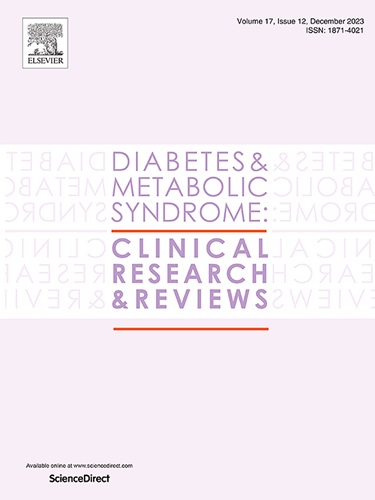Nanotechnology as a potential treatment for diabetes and its complications: A review
IF 4.3
Q1 ENDOCRINOLOGY & METABOLISM
Diabetes & Metabolic Syndrome-Clinical Research & Reviews
Pub Date : 2024-11-01
DOI:10.1016/j.dsx.2024.103159
引用次数: 0
Abstract
Background and aim
Diabetes mellitus is a chronic metabolic disorder that causes multiple complications in various organs, such as the kidney, liver and cardiovascular system. These complications are the main causes of morbidity and mortality in patients with diabetes. Nanotechnology offers new opportunities for the therapy of diabetes and its multiple complications through site-specific and precise drug delivery. This review summarizes the various studies demonstrating the potential applications of different nanoparticles in diabetes-associated complications.
Method
A literature search was conducted using PubMed, Google Scholar and Scopus databases, focusing on the role of nanoparticles in the improved delivery of various hypoglycemic agents for the treatment of microvascular and macrovascular diabetic complications.
Results
Numerous studies have shown that nanoparticles, such as nanoliposomes, polymeric micelles, dendrimers and metallic nanoparticles, improve the delivery of various hypoglycemic agents. Moreover, nanoparticles have been found to be safer, with improved pharmacokinetic and pharmacodynamic profiles.
Conclusion
This review outlines the significant role of nanotechnology in diabetes and related complications and its superiority over conventional drug delivery.
纳米技术作为糖尿病及其并发症的潜在治疗方法:综述
背景与目的糖尿病是一种慢性代谢性疾病,可引起肾、肝、心血管等器官的多种并发症。这些并发症是糖尿病患者发病和死亡的主要原因。纳米技术通过部位特异性和精确给药,为糖尿病及其多种并发症的治疗提供了新的机会。本文综述了各种研究表明不同纳米颗粒在糖尿病相关并发症中的潜在应用。方法利用PubMed、谷歌Scholar和Scopus数据库进行文献检索,重点关注纳米颗粒在改善各种降糖药递送治疗微血管和大血管糖尿病并发症中的作用。结果大量研究表明纳米颗粒,如纳米脂质体、聚合物胶束、树状大分子和金属纳米颗粒,可以改善各种降糖药的递送。此外,纳米颗粒被发现更安全,具有更好的药代动力学和药效学特征。结论本文综述了纳米技术在糖尿病及其相关并发症中的重要作用,以及纳米技术相对于传统给药的优越性。
本文章由计算机程序翻译,如有差异,请以英文原文为准。
求助全文
约1分钟内获得全文
求助全文
来源期刊

Diabetes & Metabolic Syndrome-Clinical Research & Reviews
ENDOCRINOLOGY & METABOLISM-
CiteScore
22.90
自引率
2.00%
发文量
248
审稿时长
51 days
期刊介绍:
Diabetes and Metabolic Syndrome: Clinical Research and Reviews is the official journal of DiabetesIndia. It aims to provide a global platform for healthcare professionals, diabetes educators, and other stakeholders to submit their research on diabetes care.
Types of Publications:
Diabetes and Metabolic Syndrome: Clinical Research and Reviews publishes peer-reviewed original articles, reviews, short communications, case reports, letters to the Editor, and expert comments. Reviews and mini-reviews are particularly welcomed for areas within endocrinology undergoing rapid changes.
 求助内容:
求助内容: 应助结果提醒方式:
应助结果提醒方式:


